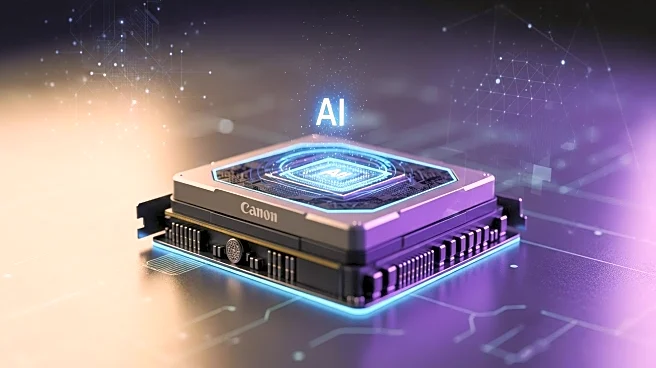What's Happening?
Nvidia reported better-than-expected quarterly results, with revenue growing 56% year-over-year to $46.7 billion, surpassing market expectations. Despite this, Nvidia's shares fell in extended trading due to perceived shortcomings in the report, such as slightly lower-than-expected data center segment revenues. Nvidia's board approved a $6 billion increase in share repurchase authorization, signaling confidence in future growth. The company is advancing its AI chip technology, with the GB300 chip showing significant performance improvements over previous models. Nvidia's CEO Jensen Huang highlighted the growing demand for AI infrastructure, predicting substantial capital expenditures from major cloud service providers.
Why It's Important?
Nvidia's performance underscores its pivotal role in the AI revolution, with its GPUs driving advancements in data centers globally. The company's focus on both hardware and software positions it as a leader in AI technology, with significant growth potential as AI infrastructure spending is projected to reach trillions by the end of the decade. However, geopolitical uncertainties, particularly regarding sales to China, pose challenges that could impact future revenue. Nvidia's ability to navigate these complexities will be crucial in maintaining its market position and capitalizing on the expanding AI market.
What's Next?
Nvidia plans to accelerate production of its GB300 chip, with widespread availability expected later in the fiscal year. The company is also preparing to launch the Rubin family of chips next year, continuing its annual product cycle. Nvidia's outlook for the third quarter remains strong, though geopolitical factors, particularly U.S.-China relations, could influence future sales and guidance. The company's efforts to gain approval for selling its Blackwell-generation chips in China will be closely watched, as this market represents a significant revenue opportunity.
Beyond the Headlines
Nvidia's advancements in AI technology highlight broader trends in the tech industry, including the increasing importance of energy efficiency and total cost of ownership in computing. As AI systems become more complex, the demand for high-performance computing solutions will continue to grow, driving innovation and competition among tech companies. Nvidia's strategic focus on AI infrastructure and its potential to standardize global AI research on American-developed hardware could have long-term implications for the industry and international tech relations.










